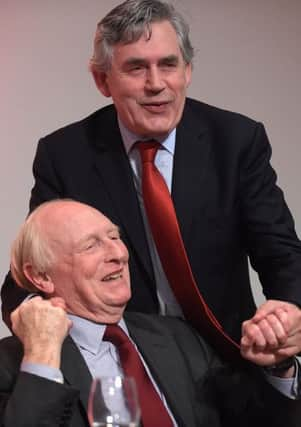Euan McColm: Cometh the hour, Corbyn's nowhere to be seen


This remarkable human capacity for ignoring inconvenient matters of evidence allowed SNP members to brush aside serious problems with the case for Scottish independence in 2014, and it kept Liberal Democrat campaigners going during last year’s general election campaign, right up until the point that the party all but vanished from the House of Commons.
But perhaps the most striking example of the delusion of the faithful can be seen among the supporters of Labour leader, Jeremy Corbyn. Those who supported his candidacy have convinced themselves that a powerful mandate to lead his party will translate into a powerful mandate to govern.
Advertisement
Hide AdAdvertisement
Hide AdCorbynistas reckon that because those with whom they interact on social media or at party meetings are convinced of the merits of their man, so must others be. It doesn’t matter if polls say otherwise because every single day of their lives, Labour members deal with people who agree with them when they say that Corbyn is a prime minister in waiting. Those among the flock who harbour doubts that this might turn out to be so have another delusion to help them make it through the day: if Corbyn doesn’t win, he’ll have been a victim of media bias. The BBC’s political editor Laura Kuenssberg, and other popular hate figures, will have thwarted democracy or some such rubbish.
The delusion of Labour party members reassuring themselves that everything is hunky dory is a matter for Labour party members; in time reality will slap them in the chops. But it appears that Corbyn is employing this same strategy when it comes to the matter of the referendum on membership of the European Union – and that, for those of all parties and none who favour a Remain vote, is bad news.
There is a compelling Labour argument for the UK staying inside the EU but the person who should be making it – the party’s leader – has failed dismally in his task.
In recent days, we’ve seen a number of Labour’s past leaders making high-profile interventions in this important debate. First, Tony Blair, accompanied by former Tory prime minister John Major, spoke at an event in Londonderry, where he warned of the dangers to the economy of a Leave victory (and wasn’t it rather fitting that two politicians who played such key roles in negotiating peace in Northern Ireland should have stood together, there, once more?), then Gordon Brown and Neil Kinnock paired up at a high-profile event in Glasgow.
Corbyn? Well, according to his people, he’s addressing meetings up and down the country.
That’s simply not good enough. His message, whatever it may be, is not cutting through.
Corbyn has put himself forward as a candidate for the most powerful position in the United Kingdom. It’s not too much to expect, surely, that a man who wishes to be prime minister might play a leading role in this campaign, is it? Instead, the Labour party has been disgracefully absent from the debate.
Of course, it is true that an obsession with Europe has long been a problem of the Conservative parliamentary group. But while there are Brexiteers among the Labour ranks, it has never been an issue that threatened the sort of instability it has created in the Tory Party.
Advertisement
Hide AdAdvertisement
Hide AdYet while Labour politicians, under the weak leadership of Corbyn, stood back and enjoyed the spectacle of blue-on-blue attacks, they lost control of the issue among their own supporters.
On Friday, Labour sources briefed that increasing numbers of the party’s supporters were in favour of Brexit. This should have come as little surprise to anyone.
Whether one regards them as justified or not, concerns about immigration are as real in areas which traditionally vote Labour as they are in Tory heartlands. Indeed, in recent years Ukip has made significant progress in areas of northern England which have long been assumed Labour strongholds.
The loudest and clearest “progressive” argument for a Remain vote has come from the SNP’s Nicola Sturgeon rather than Corbyn. The First Minister’s appearance on an ITV debate on the matter on Thursday night was typically assured. Standing beside her, Labour shadow cabinet member Angela Eagle seemed a far less credible figure.
Corbyn, it should be said, has not always been a cheerleader for greater European co-operation. The leader of the opposition is from a political tradition which saw the coming together of European nations in the 1970s as a ploy to benefit big business rather than workers.
But having declared that he does support a Remain vote, Corbyn should really have done more – done something – to help bring it about. Instead, he has been weak and unfocused on the issue. His interjections, when they do come along, are an uninspiring as they are unconvincing. Those who want to take the UK out of the EU have big, simple, populist messages to tell. They warn of the financial drain of the European project and promise to take back control from unelected bureaucrats. And, depressingly, they fuel resentment about immigrants, ignoring the reality that those who move to the UK from overseas put more into our economy than they take out.
Having called this referendum and backed Remain, Prime Minister David Cameron will struggle to stay in post if he ends up on the losing side after the 23 June referendum. His credibility will be seriously damaged.
But if Leave wins, Corbyn will also rank as a loser, as a political leader who failed to make the case for an outcome which he claims to desire.
Should the UK vote to remain, Jeremy Corbyn – who preaches only to the converted – will be able to claim no credit for the result.